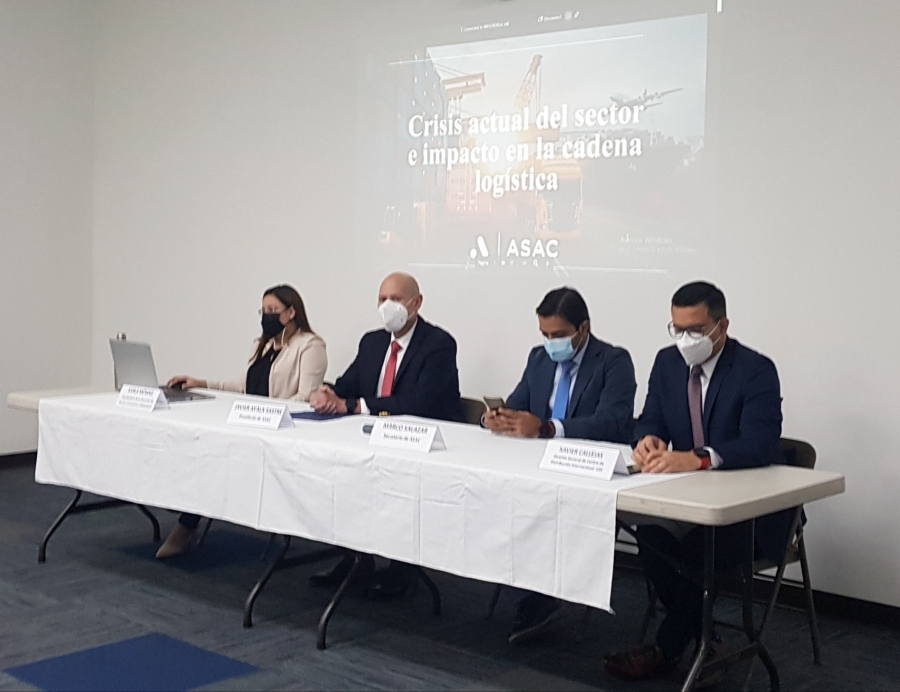In order to face the economic consequences of the pandemic, many shipping companies sold their containers; and due to sanitary restrictions, ports were closed all over the world, which caused cargo congestion and with it extraordinary waiting times, generating increases in freight rates, especially those of maritime transport on which trade in the Latin American region depends to a great extent. According to studies carried out by the Cámara de Industrias de Costa Rica, maritime rates increased by 380%, in an environment where 80% of trade is transported by sea.
Javier Ayala Sastre, president of ASAC, points out that the crisis experienced by the sector revealed the fragility of the logistics chains in the different types of industries, a factor that represents a potential brake on economic recovery, which is reflected today in inflation above the average experienced in the last three decades in the United States (6.2% as of october); and in El Salvador, 5.13%, the highest recorded since the dollarization process.
Sector outlook for 2022
To meet the high demand for cargo transportation services post pandemic, shipping lines have resumed the purchase of ships and containers to replace those sold; however, the process of renewing units will take one to two years, and it is likely that new acquisitions will not enter the market until 2023. Some container factories are still experiencing closures and thus reducing the capacity to build the amount of orders received.
According to the Cámara de Comercio e Industria de El Salvador (Camarasal), the crisis in the logistics sector has affected trade in El Salvador in the high season, as it could not enter the country all the required merchandise. This means that in the low season of 2022 would be entering what could not enter by the end of the year, said Karla Mendez, coordinator of the Directorate of Economic Affairs of Camarasal.
In addition, the representative of the guild indicated that some level of shortage has been detected in products of all kinds for the season, with emphasis on those from China; however, it cannot be assured that there will be a shortage of goods in the short term.

This situation has led companies to acquire inventories for a longer period, either in raw materials or final products, in order to guarantee supply and be able to continue with their business activities. This also implies a greater need for working capital to be able to pay for increases in volume, freight costs, warehousing, etc.
"What is a reality is that as long as raw materials continue to rise, price increases will be inevitable, affecting both the business sector and end consumers", explained Méndez.
According to industry experts, it can be speculated that the situation during the next year will be similar to that of 2021; although there are added complexities that could increase the negative effects, such as supply chain disruption, turmoil in labor markets and strong consumer demand, encouraged by government aid in different countries.
Annual Best Logistics Providers Awards
For the seventh time, ASAC is holding its awards gala where the top three winners will be recognized in the following categories: Best Airline Exclusive Cargo Service, Best Airline Passenger and Cargo Service, Best Global Carrier Service, Best U.S. Carrier Service, and Best Warehousing or Logistics Distribution Center.
These awards, presented by the members of the association to its best suppliers, ASAC emphasizes that all its associates have played an outstanding role in the context of the sector's recovery.
According to the president of ASAC, Javier Ayala, the results of the survey not only determine the winning companies each year, but also create a virtuous circle in which suppliers are given feedback on their services, with the aim of improving them and thus strengthening the logistics distribution chain in the country, he said.
The winners are:
Category: Best Warehousing or Logistics Distribution Center
1° ALMACENES DE DESARROLLO –ALDESA
2° AGDOSA-RANSA
3° BODESA
Category: Best Cargo Airline. Import and Export
1° AMERIJET INTERNATIONAL
2° DHL AVIACION
3° COPA CARGO
Category: Best Passenger and Cargo Airline. Import and Export
1° UNITED CARGO
2° AVIANCA CARGO
3° COPA CARGO
Category: Best Global Service Airline. Import and Export
1° ONE
2° COSCO SHIPPING LINES
3° MSC
Category: Best U.S. Shipping Line Service. Import and Export
1° SEABOARD MARINE
2° SEALAND
3RD KING OCEAN
 English
English  Español
Español 
